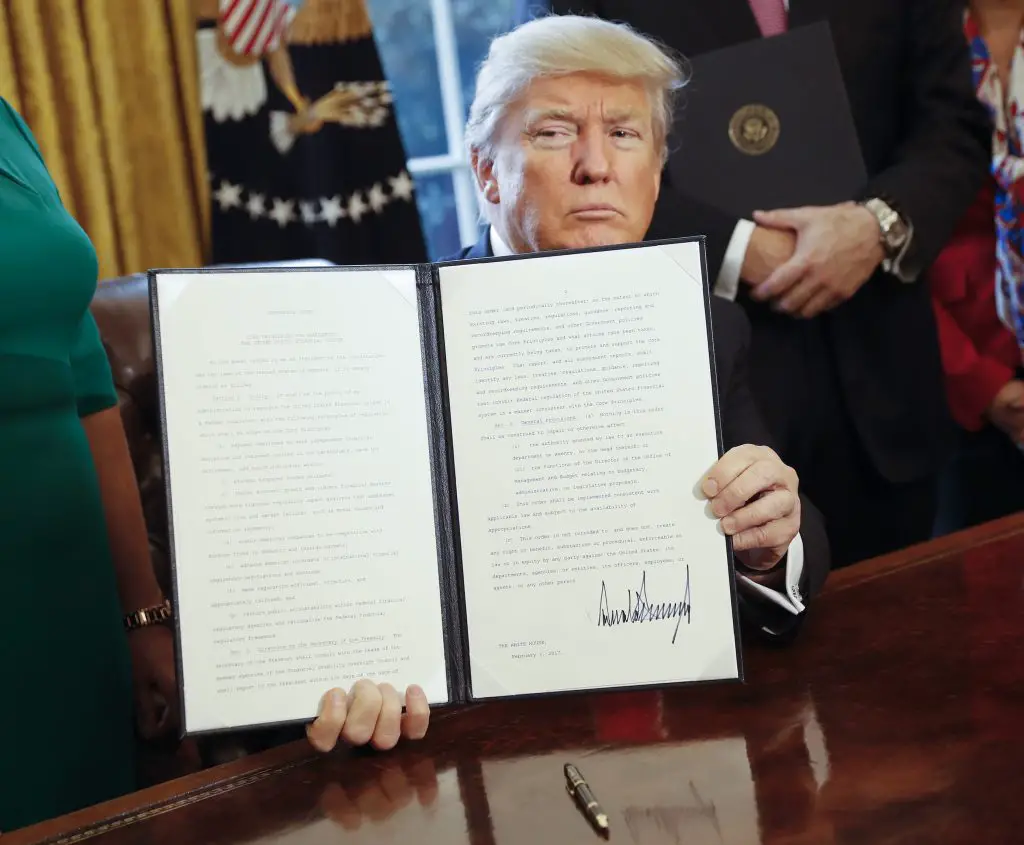In his own words, he wishes to repeal the act because, “Friends of mine, who have nice businesses, who can’t borrow money. They just can’t get any money because the banks just won’t let them borrow, because of the rules and regulations in Dodd-Frank.” Good to know you’re looking out for us everyday folk.
Recently, Treasure Secretary Steven Mnuchin presented the first of many reports reviewing and offering changes to regulations from Dodd-Frank. So what exactly would a repeal of the act mean to us, the general consumer? Better yet, what does Dodd-Frank even stand for?
What Is Dodd-Frank?
For those among us who were a little young to be directly affected by the financial crisis when it originated in 2007, Dodd-Frank (named after gov’t financial officials who amended it, Barney Frank and Chris Dodd) is the more colloquial name for the Dodd-Frank Wall Street Reform and Consumer Protection Act.
The crisis, which was started in 2007 by sub-prime bank loans from large institutions and the purchase of toxic assets, is still the worst recession since the Great Depression; losing Americans $19.2 trillion in wealth and 8.8 million jobs.
When the act was signed into law in 2010, the idea was to “promote the financial stability of the United States by improving accountability and transparency in the financial system, to end ‘too big to fail,” to protect the American taxpayer by ending bailouts, to protect consumers from abusive financial services practices, and for other purposes.”
It’s a lengthy document that consists of 16 different titles each with multiple subtitles, so let’s condense it down to the biggest impacts on the public:

The Financial Stability Oversight Council and the Office of Financial Research:
These agencies, the first part of Dodd-Frank, oversee systemic risk and supervise bank operations for those deemed “too big to fail” (a.k.a. whose failure would result in either national or global economic collapse).
The FOSC is composed of federal regulators and votes on matters pertaining to collective financial stability based on research from the OFR. Together the agencies can ask banks directly for financial information, place banks under Federal supervision, and recommend new regulations. Both operate as facets of the U.S. Treasury.
Private Fund Investment Advisers Registration Act:
Title IV required additional types of investors such as hedge fund managers and private equity analysts to register as investment advisors with the government, repealing a rule that kept them exempt since 1940. The act also increased oversight on these advisors and limited their ability to exclude financial information from their reports.
Federal Insurance Office
Dodd-Frank established the Federal Insurance Office which monitors the insurance industry, (minus health insurance) hand down recommendations to the FSOC, and discuss potential issues with state regulators.
‘Volcker Rule’
Named for the former Federal Reserve Chairman Paul Volcker, the rule dictates how banks profit through trades. It limits the amount of trading banks can do with hedge funds and private equity firms, otherwise known as “proprietary trading,” and outlines how banks cannot engage in trading that would be deemed a “conflict of interest or high-risk.”
High-risk proprietary trading of banks, with money they received from consumers, is one of the main reasons for the collapse in 2007. Investopedia states, “In other words, banks cannot use their own funds to make these types of investments to increase their profits.”
‘Payment, Clearing, and Settlement Supervision Act of 2010’
This rule basically defines financial institutions as “systemically important” or of, “systemic importance” in order to determine the level of damage their failure could cause to the US financial system.
The FSOC designates the titles to a financial body in conjunction with the CFTC (Commodity Futures Trading Commission) and the SEC (Securities Exchange Commission) and are able to hand down recommendations, rules, and enforcements.
Investor Protections and Improvements to the Regulation of Securities
Restructured the authority of the SEC (which had not changed since 1934) to protect investors, establish the Investor Advisory Committee, and allowed overall for the regulation of securities, trading strategies, fees, credit rating agencies, executive compensation, and disclosures.
The SEC can take any issues it finds through the Committee to Congress for possible legislation. You can also give the SEC any information or tips on financial crimes through their ‘Office of the Whistleblower’ portal, and possibly receive an award, the last one was for $7 million.
Bureau of Consumer Financial Protection
I discussed the CFPB last month when they handed down a $17 million fine to TransUnion and Equifax for deceptive practices; the Bureau was fully-formed under Dodd-Frank in 2010. The sole purpose of the CFPB is to regulate and oversee consumer financial products (credit cards, credit ratings, student loans, mortgages, etc.) eventually handing down sentences and fines should they find any actions that are directly hurting the public.
They also are the administrators to the ‘Mortgage Reform and Anti-Predatory Lending Act’, which was put in place under Dodd-Frank to curtail toxic mortgages and loans, and to make sure to give loans to the right borrowers (a.k.a. loans to people who can pay them back).
Trump’s Take on Dodd-Frank
In essence, Trump and his conservative administration would love to see less government oversight regarding both financial and other (if not all) industries. Most recently, Trump already went after Dodd-Frank, by signing an executive order that scrapped a rule requiring disclosure of payments to foreign governments. “This is a big signing,” he signaled during the meeting.
A major area in which Trump would like to knock Dodd-Frank down a peg is by dismantling the CFPB in any and all ways possible. Bloomberg points out, “Republican lawmakers and the financial industry say its scope is too broad and its powers too strong, maybe unconstitutionally so.”
The CFPB doesn’t answer to Congress, its budget is controlled through the Federal Reserve, and even the Fed isn’t allowed to intervene in any matters before the Director of the Bureau. Trump can’t even hire a new director, since Director Richard Cordray’s tenure is until 2018.
Still, the rules and judgments handed down by the CFPB have led to $11.7 billion in compensation to consumers, most notably the Wells Fargo (WFC) $100 million phony accounts case, which continues to have ripple effects among top executives in the company. Without the CFPB or Dodd-Frank to hold corporations accountable, I wonder if they will go back to pre-2007 ways of doing business, and of playing with the livelihoods of the general consumer.
ABOUT US
© New Kapitall Holdings LLC. All rights reserved. Kapitall Wire is a division of New Kapitall Holdings LLC. Kapitall Generation, LLC is a wholly owned subsidiary of New Kapitall Holdings LLC. Kapitall Wire, which is not a broker/dealer, offers free cutting edge content and commentary and is produced for informational purposes only and should not be construed as research. Kapitall Wire is a product offered by New Kapitall Holdings, however, KapGen compliance personnel will oversee all Kapitall Wire material prior to release.









